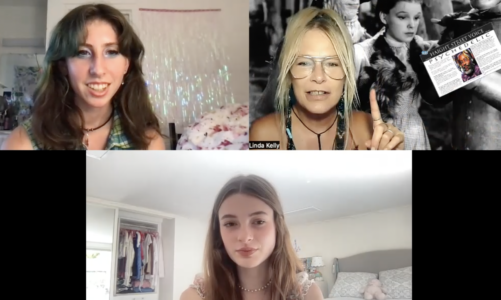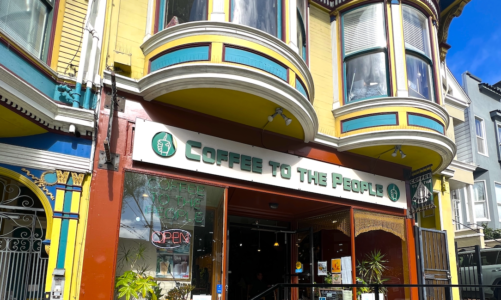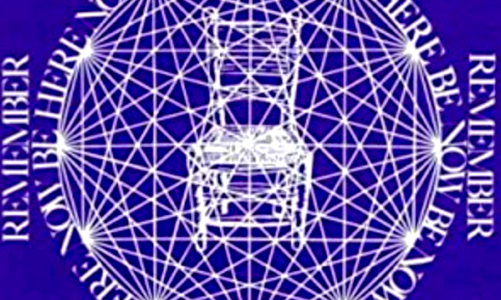Michael Stepanian and Brian Rohan of Haight-Ashbury Legal Organization [HALO] were lawyers for the likes of Hunter S. Thompson, Neal Cassady, Ken Kesey, Jerry Garcia, and represented loads of hippies back in the ‘60s when the legal system often bullied the wildly colorful generation. Michael and Brian are still truckin’ today, defending the freak flag and making sure everyone is allowed their rightful space to let it fly!
EXCLUSIVE AUDIO CLIP FROM MY INTERVIEW WITH MICHAEL AND BRIAN:
HSV: When did you guys meet?
MS: We met working in 1965.
BR: I started in ’63. We met in ’65. I remember you down the hall from me. We had the most fucked up bunch of guys you’ve ever seen. I used to walk down the hall, and Michael had his door closed. He had a tiny little office and I had a tiny little office, and I heard these noises coming out of there and I wondered, “What in the fuck is going on in there?” It sounded like he was either fucking a female gorilla or yelling at some guy! I mean had no idea! I had never met — nor had anyone else at that time — a Michael Stepanian. They threw it away after they made him!
I don’t know how we started hanging out.
MS: Look, hey, I know. It’s easy. I was there! You loved hamburgers. You had that office back there, I always had the office way in the back corner.
One day Larry Minkoff comes in and he says to me, “Hey, this guy wants to put a magazine together about music and stuff like that.” I go, “Oh good, that’s a good idea.” He says, “Well, what should I charge him?” He said, “Ah, what the fuck, you could just take a percentage of it. It’d be better, who cares?” I said, “No I’m gonna get paid by the hour.” He says, “Alright, get paid by the hour.” Turned out to be Rolling Stone.
BR: Yep, I could’ve invested in that at that time.
MS: Anyway, so Brian was eating hamburgers, he loved hamburgers. I was playing rugby at the Olympic Club, I was doing all the criminal cases, and he was doing all the civil cases and some criminal cases, too. He liked music.
We would drive down Franklin Street down Hayes to West Portal Joe’s and go through the Haight Ashbury. And Brian is saying to me at that time, “Look at this scene. Look at these people. Look at what’s going on here.” And that was the place where they were busting these kids, and he was going to be involved in the music business. He said, “I’ll do the music, you can do the criminal.” It was amazing.
BR: At first we both did the criminal stuff because there really wasn’t any music business here.
HSV: You mean the Hell’s Angels stuff?
BR: Yeah, we did Chocolate George. We represented everybody — anybody that was getting fucked over by the cops, and that was all those kids. Everybody in the City — the gay guys, the black people, the Mexicans, the dykes even had lawyers. The hippies didn’t have any lawyers because they were dirty and they smoked weed and that’s not Catholic.
MS: There was a lot of just very, very interesting vibes. There were terrific vibes. And remember [laughs] everybody at that point was clean cut, nice girls who came to California from Minnesota, from Nebraska, from Seattle ….
BR: … getting away from their parents. There were more daughters of ministers there than anyone else. When they used to come to our HALO office, I’d have them fill out a card as to where they were from. I go, “Where did these people come from?” And they’d all be ministers kids — not all of them, but a disproportionate amount.
HSV: When you were defending the hippies and the Hell’s Angels and all of that you guys were in your late 20s?
MS: In 1965, I was 26. I passed the Bar in January. I was 26 years old.
HSV: Were you sort of blown away at the whole thing you were looking at here in San Francisco? Did you think, “This is groovy, I’m gonna take some acid or smoke some pot with these people”? Was it a zoo?
BR: I met Kesey when I went to Oregon in 1958, and he was very avant-garde then, and I just accepted it. I didn’t join in it, but I thought, “What the fuck! These people have a right to express themselves.”
MS: And then you saw Kesey again in ’66 …
BR: Yeah, then he came down here and was kind enough to get arrested twice and I was the only lawyer that he knew. Of course I never charged him a penny! And one thing led to another.
I had a house over here in Larkspur, and Ginsburg, Kesey, Cassady, Kerouac would all stay at my house.
HSV: Give us a memorable, detail-filled story. You hung out with these people! You hung out with people who everybody would love to hang out with! God, to spend an hour with Kerouac or Kesey or whoever …

Neal Cassady, on the Further bus, 1964
BR: Why bother? Why not spend 5 minutes with Neal Cassady and get it all? That’s all you needed. [laughs]
MS: One time I was in the courtroom with Neal Cassady, where he had about a hundred or so traffic tickets. I’m in court with [Rommel] Bondoc, I said, “You’ll like this guy, he’s a great guy.” I knew people who knew him from the Village Gate. They really liked him, he was a cool guy — and Jack Kerouac.
So I’m in court with Neal Cassady and the judge says, “I’m looking at over 75 speeding tickets and traffic violations.” Cassady goes, “Yeah. Well, one in April of 1965. I was driving along on Haight Street, I made a left-hand turn, a cop was behind me, and there was no left turn. In February, I was driving to Marin County and a cop just jumped out …” He went through 20 tickets! Every traffic ticket. He knew every single traffic ticket. The judge is watching him and he goes, “You know? I’ll tell you, why don’t we just pay a general fine of a hundred dollars and we’ll just get rid of all these tickets?” He says, “It’s better that way.” I go, “Fine!” So of course he looks to Bondoc and Bondoc won’t give him a hundred dollars. And he says, “Mike, give me a hundred bucks.” Give him a hundred dollars, we pay it.
BR: I had the same experience with him down in South San Francisco, where there was that Italian judge down there, and Neal had not had a driver’s license since 1949. So I said to him, “You know, Neal, this guy — this is not San Francisco, this is San Mateo. This guy is an asshole. You gotta do jail time.” He said, “How much?” I said, “Probably 20 days.” So he says, “Fine. Let’s go, but first we gotta go over and get Anne Murphy.”
So we go over to North Beach and we get Anne Murphy, and they get in the backseat of my car. “Oh, I love you Neal.” “Oh, I love you Anne.” “Oh, I love you Neal.” “Oh I love you Anne.” I didn’t even wanna look in the backseat. I didn’t wanna know what was going on back there.
So we go down to South San Francisco and it’s one of these old courthouses. Neal says to Anne, “Okay, sit over there and Brian will come to get you and he’ll drive you home after court’s over.” So we march up the stairs and through the doors and down the hall. And we go out to the courtroom and there’s probably 18 Catholic girls sitting in the first two rows on the left in their uniforms.
I look up and the Italian judge isn’t there. There’s a Jewish judge there, and I think, “Oooh, maybe this guy knows what’s going on here.” So we wait for everybody, and the judge starts thumbing through this shit. It’s page after page after page of every jurisdiction, and he looks up and he says, “How is it, Mr. Cassady, that you don’t have a driver’s license?” And Neal takes his breath and recites every single thing that has ever happened to him from 1949 to 1965.
I turned around and I looked at these young girls and they’re all just staring at Cassady with their jaws agape. They’d never seen anything like this before. So the judge listens to this thing and I’ll never forget it: He pulls his glasses down on his nose and he said, “That’s fine, Mr. Cassady. I think you can go now.”
MS: Absolutely!
BR: So I spun Neal around and I says, “Let’s get out of here before he changes his mind.” I go down the courtroom, through the doors, down the hall, and Neal walked right by Anne. I’m following Neal and I say, “Neal, what about Anne?” And he looks at me and he says, “She can find her way home.”
MS: He was an unbelievable character.
BR: He was a cookie cutter thrown away.
HSV: Wow. All of this would never happen today …
BR: Well, if you had lawyers who had the relationships we had with the judges. We all were backed up by Vincent [Hallinan]. The judges knew if they fucked with us, they were fucking with Vincent. Vincent would run against them at the drop of a hat, put another candidate in there … Vincent was vindictive. You know, “Irish Alzheimer’s: you forget everything except your grudges.” Nobody fucked with Vince.
MS: Well the fact of the matter is, look, these cases began fairly small, we worked hard, Vince was a formidable guy. We were like Vince Hallinan’s boys, we were clean cut, we worked hard, they liked us. The fact of the matter is, no one understood what was really going on.
BR: Yeah, yeah, that was a theory: We got it and the judges didn’t get it.
HSV: How’s that changed today?
MS: The judges are more sophisticated. They know exactly what’s going on now. Back then — I mean I was in federal court with a guy who had 10 pounds of cocaine and the judge said, “Would you come up to the bench?” We go up to the bench — this is this clean-cut kid, fancy kid, looking good, graduate from some school, Northwestern or something. And the judge says to me, “What is this cocaine? What is going on here?” And I said, “This cocaine sells for enormous amounts and they bring this cocaine up here from Florida, it costs something like $60,000 for a kilo. They bring it up here and they sell it by the ounce and the pound, and people like it and they have a good time.” And the judge goes, “Oh, okay. Wow. They make a lot of money.” And I said, “I’m telling you, this is cocaine.”
In those days, the only drug was heroine — and marijuana. That was drugs. But they had no concept of the sale of weed, the sale of cocaine. Nobody was using heroin except essentially inner-city people. But NOT psychedelics.
Brian and I dealt with smugglers — marijuana smugglers, cocaine smugglers, cocaine distribution. Tony Serra basically represented the chemical guys, guys who would be making LSD — Owsley and all of them. We represented more rough and tumble guys. I preferred that myself, and Brian, too. We represented all the guys from Marin County. We represented, by and large, the Diggers and those guys. Tony represented the Brotherhood of Light.
BR: Tony was a true believer. He had taken a lot of psychedelics.

Tony Serra [L] Michael Stepanian [R] May 2018, San Francisco
HSV: Because this is the psychedelic edition, what would you say to the idea of marijuana, psychedelics, acid, mushrooms … anything. It could be then, now — anything you have to say about psychedelics.
Michael Stepanian: I think the LSD experience, if the person is of a certain type, and under the right circumstances, and having a host or hostess with you, I think the psychedelic experience is very, very profound. There’s no question about that.
Now, it’s not for everybody. I mean I’ve experienced and experimented with it once or twice or three times, but the idea of being in a context outside of reality … the biggest problem is, no matter how strong you are intellectually, not able to bring yourself back is a pretty heavy mental discipline. Because LSD at 300 micrograms minimum you are looking at this outdoor very beautiful scene out here, and then the whole thing turns …
Brian Rohan: … starts to move. Dinosaurs come up out of the water …
MS: It moves and it turns … or something happens where you can’t get back to this moment of pre-dosage. You can’t get back. And that’s heavy unless you have a degree of discipline and a degree of self-confidence. Someone who is intellectually weak or emotionally somewhat disturbed — “rats and bats” I call them — they might freak out on not being able to get back to this moment that we’re having right now, of reality. That’s the toughest part. But if you can handle it [laughs] it’s other-worldly. It’s not just getting high.
BR: You know, it never entered my mind. I could not give a shit less. These people were people who were trying something new, and of course, something new had to be bad in San Francisco — we’re talking Irish Catholics, Italian Catholics …
MS: [laughs] New?!
BR: If the gay people were getting mauled, I didn’t have to be gay, they were getting mauled. Same with the gay women — I didn’t have to get a bike and go ride around and become a dyke, I just would protect their right to do whatever they wanted. And that was my basis. It was just a group of people that were being unjustly prosecuted. We tried to set the City right, and I think we did a real good job at it. We protected all those kids up in the Haight for as long as we could.
MS: Well, we’ve been doin’ it for 50 years, Brian.
BR: And that segues right into the music business. In the music business, I didn’t have to like the bands that I represented. I just didn’t want them to get fucked by the record companies — and they were all getting fucked by the record companies, cheated and lied to and mis-accounted, and we set them straight, that’s why we were there. I didn’t have to become a fan of Journey to protect Journey from the record company.
HSV: So is it that Rohan brought you into the cool, fun music stuff, Michael?
MS: I was the boring, regular criminal lawyer guy! [laughter]
BR: He was hardly boring. Michael understood music, he understood jazz. He had an East Coast sensibility. He taught me a lot.
MS: Brian brought me in. He opened my eyes literally to the Haight-Ashbury generation, the psychedelic generation. I don’t know if I’d be here had it not been for Brian making a pathway for me to be on.

Brian Rohan [L], Michael Stepanian [R], May 2018, Larkspur, CA




